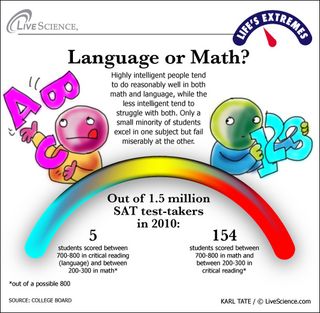Can a Child With Dyslexia Do Well at Language Arts but Poorly at Math
Life's Extremes: Math vs. Linguistic communication

In this weekly serial, LiveScience examines the psychology and sociology of contrary human being behavior and personality types.
Do y'all know what "abecedarian" means? What most the solution to 250 x 11?
Most people would concord they are meliorate at verbal or math subjects in school, as grades ordinarily exercise adjure. Highly intelligent individuals often exercise well in both subjects, and may know the answers to both questions in a higher place, lickety-separate, while less intelligent people tin struggle. But a minority of u.s.a. excels in the linguistic communication department and bombs at mathematics, or vice versa.
(As an adjective, abecedarian refers to something relating to the alphabet; ii,750 is the solution to the equation.)
These extremes in ability speak (or equate) to the very makeup of our brains. "The encephalon systems for maths and language are quite unlike," said Brian Butterworth, emeritus professor of cognitive neuropsychology at University Higher London, using British English language'due south dialect for "math." "And then perhaps it is non surprising that these ii capacities are rather contained."
Past learning more about the regions of our brains responsible for language and math processing, researchers promise to anytime better aid those with severe deficits, such equally in reading ability, called dyslexia, and general numeracy, called dyscalculia.
Wordly wise
Exact ability — reading, writing and speaking — arises from beyond much of our brain, requiring key elements to harmonize.
When we read, for instance, the "ventral stream" located at the rear of the head and involved in object recognition becomes active. Parietal (on the side) and frontal regions activate besides, as revealed by neuroimaging studies. These brain areas figure out the "sounds" of letters and the semantics of words. [Inside the Brain: A Journeying Through Time]
In well-nigh 5 percent to 12 pct of the population with dyslexia, reading is fraught with difficulty. Spelling is sometimes a problem, likewise. An unknown percentage of the population also grapples with so-called dysgraphia, an disability to write. Dysgraphics make ill-formed messages with improper spacing, or produce the incorrect discussion for a concept, such as "daughter" or "boy" instead of "child."
Brain injuries can also cause these verbal deficits, same equally with math. Genetics, though, clearly has a profound impact, based on learning disabilities running in families and genetic ailments that produce clear deficits.
In the example of well-studied dyslexia, several candidate genes have emerged that lawmaking for how neurons in the brain form interconnections.
"The idea is that throughout gestation and early on development, neurons traveling to where they should be going don't reach their targets," said Guinevere Eden, director of the Centre for the Report of Learning at Georgetown University Medical Centre, who studies dyslexia.
A caput for numbers
A typically separate group of people has trouble not with reading and writing, only with learning bones mathematics. Dyscalculia affects some half-dozen percent to 8 percent of the earth population, studies advise. Every bit with dyslexia, something of a genetic component exists, with identical twins sharing dyscalculia almost lx percent of the time. [Seeing Double: eight Fascinating Facts About Twins]
Several encephalon areas activate when subjects perform calculations, in particular the intraparietal sulcus, located at the peak-dorsum area of our heads.
"This appears to be the 'math heart' of the brain," said Melissa Libertus, a postdoctoral fellow in the department of psychological and brain sciences at Johns Hopkins University. "If this role of the brain has a problem, then those people have math problems."
ABCs or 123s
Libertus has just published a newspaper showing that preschoolers have varying degrees of "number sense," or an innate ability to estimate quantities. Information technology's likely, Libertus said, that people with higher inborn skills perform better at math throughout their lives. Similarly, Eden has studied children with precocious reading abilities, showing that some of united states of america only take a knack.
On the other mitt, being born with dyslexia or dyscalculia, does not necessarily produce a math or linguistic communication person. In this way, upbringing and education oft atomic number 82 to language or math preferences based on innate strengths and weaknesses.
"Of grade, environment and experience play a major role," Butterworth said. Parents who have a lot of books around the business firm might encourage a child to go more into reading and writing, whereas math games promote doing sums instead.
Homo calculators and polyglots
Although our brains are evolutionarily hard-wired for speech and a basic sense of numbers, nosotros must be taught to read, write and practice arithmetic. And regardless of 1'south natural abilities, practice — to an extent — can brand perfect.
Many prodigious "man calculators," for example, admit to being obsessed with numbers, thinking nearly and working with them all solar day. Similarly, polyglots such as Emil Krebs, a German human being who claimed mastery of 68 languages, must report hard to become fluent in non-native tongues.
Supporting this "practice makes perfect" view is that fact that language or math abilities are non tied to IQ scores. Shakuntala Devi, an Indian woman, astoundingly multiplied two 13 digit numbers in her head in 28 seconds, yet possessed an boilerplate IQ.
Math "savants" go even farther, such as Dustin Hoffman'southward character in "Rain Man." These rare individuals perform feats of mathematical wizardry but accept terrible verbal skills and low IQ scores.
Ultimately, markedly skewed abilities in language and math come near from a confluence of factors, researchers agree. Genes, development and personal zeal all determine our alphabetic character grades and where we fall on the number line.
stewartdeersomided.blogspot.com
Source: https://www.livescience.com/16897-math-language-dyslexia-dyscalculia.html

0 Response to "Can a Child With Dyslexia Do Well at Language Arts but Poorly at Math"
Post a Comment